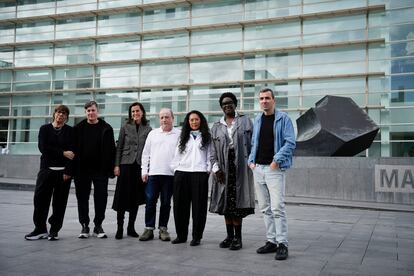Ibon Aranberri (Guipúzcoa, 1969) is the first winner of the MACBA Foundation Prize worth 50,000 euros. The Museum of Contemporary Art of Barcelona has launched its own award, independent of the national ones, but in which it has involved the entire Spanish and Portuguese art sector, from Barcelona, rewarding a creator who, according to the jury, has “the ability to transform museum rooms into a space for social imagination.”
Tears fell down the face of the Basque artist, who has celebrated this recognition as a way to “continue working” after a (almost) completed project that began during the pandemic and resulted in two exhibitions: Partial View (Reina Sofía Museum, 2023) and Entresaca (Museum Atrium). “I felt like they were burying me in life with this idea of a mid-career retrospective,” explained the creator who combines sculpture, photography and film, among other disciplines, in his work. “I receive it with the intention of continuing,” he said, “it is a lot of money, also, for the budgets that we artists usually manage.”
Along with Aranberri, the Cabello/Carceller collective, Sandra Gamarra and David Bestué have heard that they are the three finalists of this first edition. Each one will receive 10,000 euros.
This first act of announcing the award (the celebration concludes on Tuesday night with a gala presentation) has materialized the idea with which it was conceived. Ainhoa Grandes, president of the MACBA Foundation, Cristina López, director of this organization, and Elvira Dyangani Ose, director of the museum, the promoters of the recognition, called on artists, gallery owners, collectors and museums to test what they would like to celebrate the recent work of creators (developed in the last two years) so that their names and their works “become part of the social conversation,” Grandes explained. That is, to help that uncomfortable moment that usually occurs when you ask a friend, acquaintance or family member for two or three names of contemporary artists, and they are only able to cite exponents like Barceló from memory.
In addition to the task of identifying new creators (it does not have to be synonymous with emerging ones), the award aims to reposition artistic work on the agenda. Find a place for it, not only in a private collection or in the rooms of a museum, but when talking about gender, remember, for example, Helena Cabello and Ana Carceller, a creative couple who were pioneers in reflecting on this topic in the art, although until less than a decade ago, bibliographic references about their work were scarce, something of which they are aware. “Assaulting the institution is part of our job because we were not invited to occupy them for a long time,” they explained. They believe that “another world and other personalities are possible in art,” and they trust that “everyone has the right to be complete beings and express ourselves as we want.”
But, at least right now, they have doubts about what’s to come. They do not mention the advance of the extreme right in Europe, the victory of Donald Trump in the United States, the reaction against feminism and the consequent setback in women’s rights, but in their brief words the need to hold on to this new award resonates. . “We have worked without the pressure of success, we did not expect awards or approval, that is why we are going to enjoy this because a complicated decade is coming,” they have said about an award that recognizes their samples. A voice for Erauso. Epilogue for a trans timein Azkuna Center; y The occupationin the Patio Herreriano Museum in Valladolid.
Sandra Gamarra, the Peruvian artist who became the first Latin American to represent Spain in the last edition of the Venice Biennale, the largest global event for contemporary art, has added another topic to that conversation that in recent years has had its particular forum in museum halls. Her work involves researching artistic and cultural heritage to demonstrate the lack of decolonial narratives. That was the mirror that he put before Spain in Migrant art galleryher exhibition at the Venetian event and for which she has been awarded. “I use painting to dismantle already-made stories,” he has described his work, which is made up of images from Spanish state collections that are part of his own imaginary, but that could be found anywhere in Europe and North America. “The museum determines you, it makes knowledge watertight, I want to want to break certainties and comfort, and that single channel in which things are seen.”
Bestué combines diverse sculptural practices around specific spaces, among others, his city, Barcelona, to, he said, “tell something about the present and rescue things from the past that are not entirely clear.” This is what he did in sand cityin Fabra i Costas of the city of Barcelona, and Pajarazosat the Patio Herreriano Museum in Valladolid, his two exhibitions recognized with this award.
Before starting to speak, the artist asked if he could do it in Catalan. Immediately, it received the approval of the three creators of this award who, minutes before, had highlighted that this is “a Spanish and Portuguese award that is given from Barcelona” and to which they have managed to convene a committee of six specialists in contemporary art (responsible for the list of candidates) and a jury made up of six experts, among whom are the culture advisor of the Generalitat, the director of the Museo Nacional Centro de Arte Reina Sofía or Abdellah Karroum, director of the Arab Museum of Modern Art in Doha, Qatar. That is, international and multidisciplinary.

